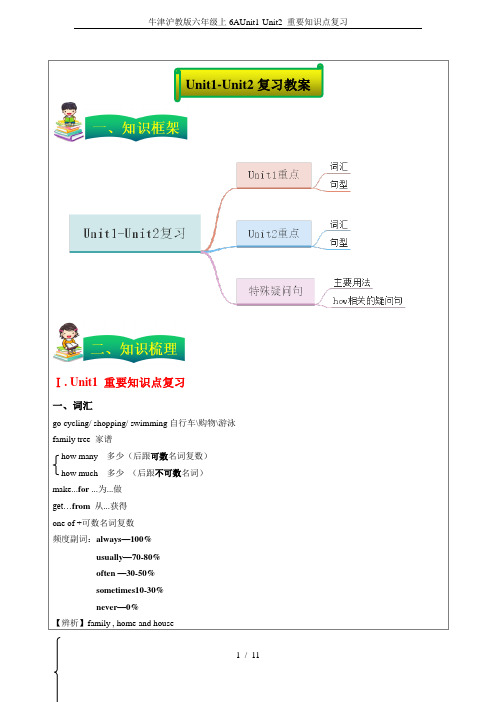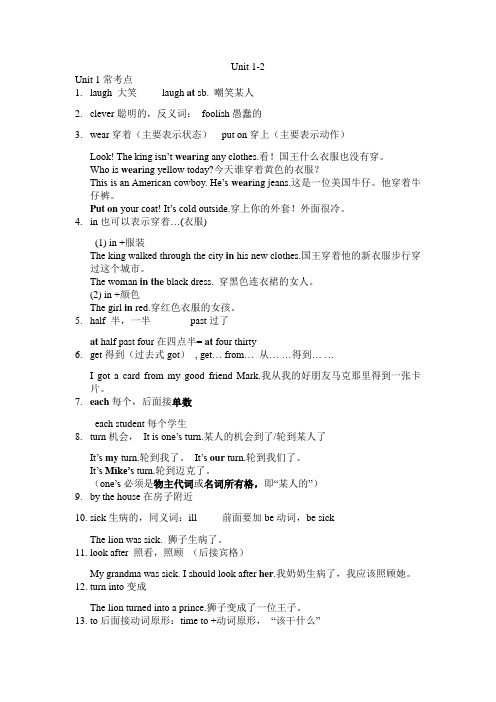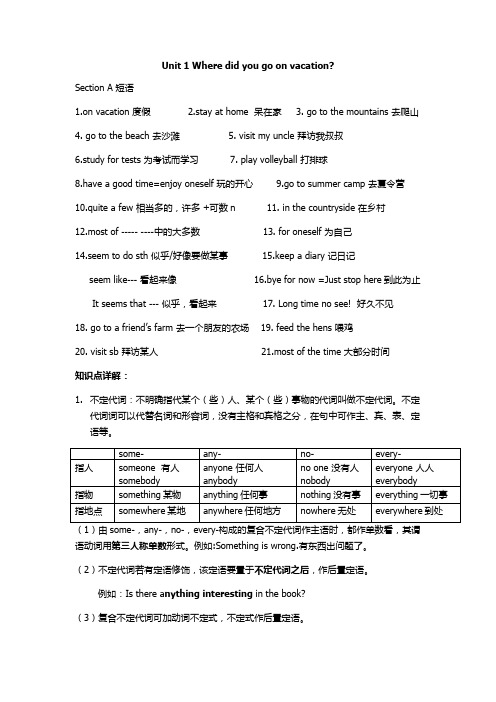Unit1-2的期末复习知识点
- 格式:ppt
- 大小:566.50 KB
- 文档页数:20

新人教PEP四年级英语上册Unit1-2知识点归纳Unit 1 My classroom一、词汇1. classroom 风扇2. window 墙壁3. blackboard 图画4. light 计算机5. picture 窗户6. door 地板7. teacher’s desk教室8. computer 电灯9. fan 讲台10. wall 门11. floor 黑板12. really (表示兴趣或惊讶)真的13. near 距离近14. TV 电视15. clean 打扫16. help 帮助17. in 在…里面18. on 在…上面19. under 在…下面20. near 在…旁边二、句型1. What’s in the classroom? 教室里有什么?2. One blackboard, many desks and chairs.一块黑板,许多桌子和椅子。
3. Where is it? 它在哪儿?4. It ’s near the window. 它在窗户旁边。
5. Let’s clean the classroom! 让我们打扫教室吧!6. All right. 好的。
7. Good idea. 好主意。
8. Let me help you. 让我来帮你吧.9. Thank you. 谢谢.10. We have a new classroom. 我们有间新教室。
11. Let’s go and see!我们去看看吧!三、Let ‘ s do(中、英文能互译,注意动词短语)1. Open the door. 开门2. Turn on the light. 开灯3. Close the window. 关窗4. Put up the picture. 挂图画5. Clean the blackboard. 擦黑板四、知识点1. Let sb. do sth. 让某人做某事例如:Let me help you. Let us go! ( let us= let’s )2. clean v. 打扫,清洁例如:clean the window 擦洗窗户/clean the classroom 打扫教室/ clean the board(= blackboard) 擦黑板/clean the desk 擦桌子3. adj. 干净的,清洁的(→dirty adj. 脏的,脏乱的) 例如:Our classroom is very clean.4. Where is/ are sth.? 某物在哪里?例如:Where is my book?/Where is his pen?/Where are her friends?/Where are their chairs?5. open the door sweep the floor clean the board6. 表示拥有have 和there be句型的用法1)通常,表示某人拥有某物时,用have 我有一只小猫。

英语必修一UNIT1-2知识点详解及练习教学总结(人教版英语高考复习)Unit 1 知识点一、知识点1. be good to 对……友好be good for 对……有益;be bad to…/be bad for…I will be good to other people.我会善良的对待其他人.It would be good for you to spend a holiday in the sun. 在有阳光的地方度假会给你带来很多好处。
The Olympics will be good for business. 奥运会的召开将有利于商业的发展。
be good at 擅长make good 有成就;成功as good as 实际上;几乎等于a good deal 许多,大量彻底的;完全的;痛快的to have a good drink 喝个痛快2. add up 加起来add up to 合计,总计add… to 把……加到…… add to 增加Add up your score and see how many points you get? 把你的分数加起来,看看得多少?Some people can add up quite easily in their heads, but not all.Good friends do not add up what they do for each other; instead they offer help when it is needed.The figures add up to 270. 这些数字加起来是270。
You shouldn’t add fuel to the flame 你不应该火上加油Fireworks added to the attraction of the festival night. 焰火使节日的夜晚更加生色。

Unit1-Unit2复习教案Ⅰ. Unit1 重要知识点复习一、词汇go cycling/ shopping/ swimming自行车\购物\游泳family tree 家谱how many 多少(后跟可数名词复数)how much 多少(后跟不可数名词)make...for ...为...做get…from从...获得one of +可数名词复数频度副词:always—100%usually—70-80%often —30-50%sometimes10-30%never—0%【辨析】family , home and housefamily:“ 家、家庭、家人”。
作主语时,如果强调的是家庭成员,谓语动词用复数;如果强调的是一个家庭,则谓语动词用单数。
family tree 家谱home "家",指同家人共同生活,居住的地方,特别强调家里的氛围和环境,不一定含有建筑的意思,带有感情色彩的词。
如:hometown 故乡...house“住宅”、“房子”,指居住的房屋,建筑物。
二、语法和重点句型1. 用This is ... /These are ...来介绍家人。
二者都表示近指,“This is .. . ”后跟单数名词,“These are ...” 后跟复数名词或者多个不同的对象。
2.用how many 来询问数量后接可数名词的复数形式,当我们提问你有多少……时候,如果How many后跟人,常用how many... do you have?如果How many 后跟物,常用how many...have you got?3.What do you do with your... ? 和What else do you do with your... ? 来提问与家庭成员或亲戚一起做什么.else 意为别的其他的,常用于特殊疑问词或不定式之后,如what else, something else等。

最新部编版四年级英语上学期期末复习最全知识点归纳Unit 1: Greetings and Introductions- Greetings: Hello, Hi, Good morning, Good afternoon, Good evening- Self-introduction: My name is ..., I am ... years old- Classroom language: Sit down, Listen, Raise your hand, Stand up, WriteUnit 2: Numbers and Colors- Numbers 1-100- Colors: red, blue, yellow, green, orange, purple, pink, black, white, brownUnit 3: Family and Friends- Vocabulary related to family members: father, mother, brother, sister, grandfather, grandmother- Simple sentences about family members: This is my mother. His name is John, etc.Unit 4: Daily Routines- Vocabulary related to daily routines: get up, havebreakfast/lunch/dinner, go to school, go home, do homework, go to bed - Simple sentences about daily routines: I get up at 7 o'clock. I have breakfast at 7:30, etc.Unit 5: Food and Drinks- Vocabulary related to food and drinks: apple, orange, banana, pizza, burger, sandwich, milk, juice, water- Simple sentences about food and drinks: I like apples. I drink milk for breakfast, etc.Unit 6: School Life- Vocabulary related to school objects: book, pencil, eraser, ruler, pencil case, schoolbag- Simple sentences about school life: I have a red pencil case. I bring my schoolbag to school, etc.Unit 7: Months and Seasons- Vocabulary related to months and seasons: January, February, March, April, May, June, July, August, September, October, November, December, spring, summer, autumn, winter- Simple sentences about months and seasons: My birthday is in January. I like spring, etc.Unit 8: Weather- Vocabulary related to weather: sunny, rainy, windy, cloudy, snowy- Simple sentences about weather: It is sunny today. It is raining outside, etc.Unit 9: Animals- Vocabulary related to animals: cat, dog, rabbit, bird, fish, elephant, monkey- Simple sentences about animals: I have a pet dog. Cats are cute, etc.Unit 10: Hobbies and Sports- Vocabulary related to hobbies and sports: draw, sing, dance, swim, play football, basketball- Simple sentences about hobbies and sports: I like drawing. We play basketball every Saturday, etc.Unit 11: Transport- Vocabulary related to transport: car, bus, bike, train, plane, boat- Simple sentences about transport: I go to school by bus. We are traveling by train, etc.Unit 12: Occupations- Vocabulary related to occupations: doctor, teacher, firefighter, police officer, chef- Simple sentences about occupations: My mom is a doctor. I want to be a firefighter, etc.Unit 13: Places in the City- Vocabulary related to places in the city: park, supermarket, library, hospital, post office- Simple sentences about places in the city: We are going to the park. The library is closed today, etc.Unit 14: Festivals and Celebrations- Vocabulary related to festivals and celebrations: Christmas, New Year, birthday, Halloween, Spring Festival- Simple sentences about festivals and celebrations: I love celebrating Christmas. My birthday is in June, etc.Unit 15: Review- Review of all the units' vocabulary and simple sentences以上是最新部编版四年级英语上学期期末复的知识点归纳。

Unit 1-2Unit 1常考点ugh 大笑laugh at sb. 嘲笑某人2.clever聪明的,反义词:foolish愚蠢的3.wear穿着(主要表示状态)put on穿上(主要表示动作)Look! The king isn’t wear ing any clothes.看!国王什么衣服也没有穿。
Who is wear ing yellow today?今天谁穿着黄色的衣服?This is an American cowboy. He’s wear ing jeans.这是一位美国牛仔。
他穿着牛仔裤。
Put on your coat! It’s cold outside.穿上你的外套!外面很冷。
4.in也可以表示穿着…(衣服)(1) in +服装The king walked through the city in his new clothes.国王穿着他的新衣服步行穿过这个城市。
The woman in the black dress. 穿黑色连衣裙的女人。
(2) in +颜色The girl in red.穿红色衣服的女孩。
5.half 半,一半past过了at half past four在四点半= at four thirty6.get得到(过去式got), get… from… 从… …得到… …I got a card from my good friend Mark.我从我的好朋友马克那里得到一张卡片。
7.each每个,后面接单数each student每个学生8.turn机会,It is one’s turn.某人的机会到了/轮到某人了It’s my turn.轮到我了。
It’s our turn.轮到我们了。
It’s Mike’s turn.轮到迈克了。
(one’s必须是物主代词或名词所有格,即“某人的”)9.by the house在房子附近10.sick生病的,同义词:ill 前面要加be动词,be sickThe lion was sick. 狮子生病了。

Unit 1 Where did you go on vacation?Section A 短语1.on vacation 度假2.stay at home 呆在家3. go to the mountains 去爬山4. go to the beach 去沙滩5. visit my uncle 拜访我叔叔6.study for tests 为考试而学习7. play volleyball 打排球8.have a good time=enjoy oneself 玩的开心 9.go to summer camp 去夏令营10.quite a few 相当多的,许多 +可数n 11. in the countryside 在乡村12.most of ----- ----中的大多数 13. for oneself 为自己14.seem to do sth 似乎/好像要做某事 15.keep a diary 记日记seem like--- 看起来像 16.bye for now =Just stop here到此为止It seems that --- 似乎,看起来 17. Long time no see! 好久不见18. go to a friend’s farm 去一个朋友的农场 19. feed the hens 喂鸡20. visit sb 拜访某人 21.most of the time 大部分时间知识点详解:1.不定代词:不明确指代某个(些)人、某个(些)事物的代词叫做不定代词。
不定代词词可以代替名词和形容词,没有主格和宾格之分,在句中可作主、宾、表、定语等。
语动词用第三人称单数形式。
例如:Something is wrong.有东西出问题了。
(2)不定代词若有定语修饰,该定语要置于不定代词之后,作后置定语。
例如:Is there a nything interesting in the book?(3)复合不定代词可加动词不定式,不定式作后置定语。
八年级上册units 1-2一、掌握词汇1.anyone pron.任何人16.enough adj./adv.足够的(地)29.through prep.以;凭借;穿过2.anywhere adv.任何地方17.hill n.小山;山丘30.mind n.头脑;心智3.something pron.某事;某物18.duck n.鸭31.body n.身体4.nothing pron.没有什么东西19.hardly adv.几乎不32.such adj./pron 这样的;那样的5.everyone pron.每人;所有人20.ever adv.曾经;从来★such as(=like)例如;像……6.myself pron.我自己;我本人21.Internet n.互联网33.together adv.共同;在一起7.yourself pron. 你自己22.program n.节目34.magazine n.杂志;期刊pl. yourselves 你们自己23.full adj.满的;忙的35.however adv.然而;不过8.pig n.猪★be full of...充满……36.almost adv.几乎;差不多9.seem v.似乎;好像;看来24.maybe adv.大概;可能37.none pron.没有一个;毫无10.someone pron.某人25.least adv.最少;至少38.less adv.较少;较小11.diary n.日记;记事簿adj./pron.至少;不少于adj./pron 较少的;较小的12.bird n.鸟★at least 至少;起码★less than 少于;不超过13.bicycle n.自行车26.coffee n.咖啡★more than 多于;超过14.top n.顶部27.result n.结果;后果★at most 最多;至多★at the top of...在……顶部★as a result 结果15.below prep./adv. 在……下面28.although conj.虽然;尽管二、理解词汇1.hen n.母鸡 3.housework n.家务活 5.point n./v. 得分;点;指2.umbrella n.伞;雨伞 4.online adj./adv.在线的(地)★an umbrella★help with housework★point to/at/out...指向/着/出三、词汇拓展1.hunger n.饥饿---hungry adj.饥饿的10.one num.---first(序数词)第一2.health n.健康---healthy adj.健康的---once adv.两次;两倍---healthily adv.健康地11.two num.---second(序数词)第二;秒★in health 身体健康---twice adv.两次;两倍3.bore v.使厌烦---boring adj.令人厌倦的;无聊的12.act v.表演;扮演n.行为---bored adj.厌倦的;感到无聊的---actor/actress (男)演员/女演员4.decide v决定;选定---activity n.活动---decision n.决定;抉择---action n.行动★decide to do sth.决定做某事---active adj.积极的---actively adv.积极地★make a decision/decisions 做决定★take action 采取行动5.build v.建筑;建造---built---built13.try n.尝试;设法---building n.建筑物;房子★have a try 试一试★build up 增强;加强v.try---tried---trying 尝试6.wait v.等待;等候★try to do sth.尽力做某事---waiter n.男服务员;侍者★try doing sth.试着做某事---waitress n.女服务员★try out (for)参加……选拔;试用★wait for...等待14.wonder v./n. 想知道;琢磨7.die v.死亡;灭亡;消失---died---died---wonderful adj. 精彩的;绝妙的---dying(现在分词)15.few adj./pron. 不多;很少;几乎无---dying adj.临终的;垂死的---fewer 更少的---dead adj.死的;失去生命的---fewest 最少的---death n.死;死亡★a few 少量的(修饰可数名词复数)8.write v.写---wrote---written★quite a few 相当多;不少---writer n.作家;作者★wonder +宾语从句(if/whether/特词引导)9.wet adj.湿的;潮湿的;下雨的★die of死于(内因)die from死于(外因)---wetter---wettest 更湿的;最湿的★die out 灭绝四、重点短语1.feel like 给……的感觉;感受到feel like doing =would like to do =want to do想要做某事2.decide to do sth.=make a decision to do sth.决定做某事3.of course 当然4.hardly ever 几乎从不5.more than 超过;多于6.keep/stay healthy=keep/stay fit7.once a week 一周一次8.twice a week 一周两次9.three times a week 一周三次10.be full of...=be filled with 充满五、好词好句假期1.It was sunny and hot, so we decided to go to the beach near the hotel.这里阳光明媚而且天气炎热,因此我们决定去我们旅馆附近的海滩。
人教版英语七年级上册Unit1-2知识点复习与讲解第8讲Unit1-2复习核心词汇:Unit1name nice to meet your Ms his and her yes she he no not zero one two three four five six seven eight nine telephone number phone first last friend China middle schoolUnit 2sister mother father parent brother grandfather grandmother grandparent family those these who they well have day son daughter cousin grandpa grandma mom dad aunt uncle here photo next picture girl dog核心短语:Unit 1first name last name telephone number/ phone number middle schoolUnit 2a photo of my family in the first photo in the next picture核心句型:Unit 1--What’s your name--My name is Gina./ I’m Gina.Nice to meet you!--Are you Helen--Yes, I am. / No, I’m not. I’m Gina.--What’s your telephone number--It’s 284-2942.Unit 2This is my friend Jane. That’s my grandfather.These are my brothers. Those are my parents.--Who’s she --She’s my sister.--Who’re they --They’re my grandparents.--Have a good day! -–Thanks!Here is a photo of my family.核心语法点:Be动词、实义动词、指示代词、人称代词1,形容词性物主代词:my(我的) your(你的) his/her/its(他/她/它的) our(我们的) your(你们的)their(他们的)后面需要接名词,修饰名词,做前置定语。
五年级下册英语素材-Unit1-2 知识点复习牛津译林版五下U1、U2复习【教学目标】能够理解及掌握Unitl与Unit2两个单元的内容【教学重点】能够掌握"Why…?”和“Because….”句型的用法能够掌握“ Where…?”和“ How…?”的用法【教学难点】常见特殊疑问词的用法;助动词do/does的用法【教学过程】一、语法:(1)动词第三人称单数形式:在一般现在时中,当主语是第三人称单数时,谓语动词要使用第三人称单数形式,变形规则如下:―(2)常见特殊疑问词的用法:特殊疑问词是特殊疑问句的引导词,特殊疑问句的结构一般都是特殊疑问词+一般疑问句”。
特殊疑问句不能用y e s或n o来回答,而是要根据询问的特殊疑问词]意思用法what 什么冋东西whe n 什么时候问时间who 谁问人物whose 谁的问所属(3)助动词do/does的用法:助动词,顾名思义,就是帮助其他动词的。
在一般现在时中,作为助动词的do/does是没有词义的,do/does在句中的作用就是帮助构成一般现在时的疑问句和否定句。
也就是说,如果句中没有be动词或者情态动词而是行为动词(表示一个具体动作的动词),这个句子又要变形成疑问句或者否定句,那就要使用到助动词了。
句中有助动词的时候,所有的变形均由助动词do/does完成,行为动词都只使用原形。
助动词使用规则如下:—[第一人称单复数主语:第二人称单复数主语:第三人称单数第三人称复数1、陈述句:主语+行为动词原形+其他. 1、陈述句:主语+行为动词第三人称单数形式+其他.2、否定句:主语+ don' +行为动词原形+其2、否定句:主语+ doesn' +行为动词原形+他.其他.3、一般疑问句:Do+主语+行为动词原形+其3、一般疑问句:Does +主语+行为动词原形+他?其他?4、特殊疑冋句:特殊疑冋词+ 一般疑冋句?4、特殊疑冋句:特殊疑冋词+ 一般疑冋句?]此时一般疑冋句中的助动词是do 此时一般疑冋句中的助动词是does (1)结构:Why + be动词/助动词+主语+其他?Because + 主语+其他.(2)用法:why意思是“为什么”,用来询问对方原因;because意思是“因为”,常用于回答why引导的特殊疑问句,也可以单独使用。
七年级上册英语1~2单元知识总结一、Unit 1 My name's Gina.(一)重点单词。
1. name.- 名词,意为“名字;名称”。
例如:My name is Tom.(我的名字是汤姆。
)2. nice.- 形容词,意为“令人愉快的;宜人的”。
常用来形容人或事物给人的感觉。
例如:Nice to meet you.(很高兴见到你。
)3. to.- 这里是不定式符号,常用在一些固定搭配中,如“Nice to meet you.”中的“to”,无实际意义。
4. meet.- 动词,意为“遇见;相逢”。
例如:I meet my friend at the school gate.(我在学校门口遇见我的朋友。
)5. too.- 副词,意为“也;又;太”。
作“也”讲时,用于肯定句末。
例如:I'm fine, too.(我也很好。
)作“太”讲时,用来修饰形容词或副词。
例如:The box is too heavy.(这个盒子太重了。
)6. your.- 形容词性物主代词,意为“你的;你们的”,后面必须接名词。
例如:Your book is on the desk.(你的书在桌子上。
)7. his.- 形容词性物主代词,意为“他的”。
例如:His name is Jack.(他的名字是杰克。
)8. her.- 形容词性物主代词,意为“她的”。
例如:Her pen is red.(她的钢笔是红色的。
)(二)重点短语。
1. name's = name is.- 用于介绍自己的名字。
例如:My name's Gina. = My name is Gina.(我的名字是吉娜。
)2. Nice to meet you.- 初次见面时的常用问候语,回答是“Nice to meet you, too.”(很高兴见到你。
见到你也很高兴。
)3. last name.- 意为“姓”,也可以说“family name”。